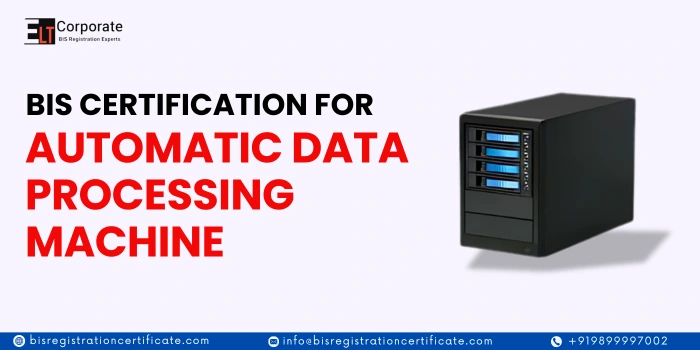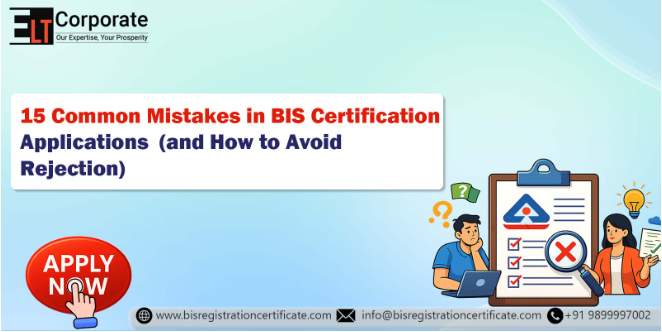Automatic data processing machines are crucial hardware systems that collect, process, and store data efficiently. These include devices like magnetic readers and data transcribers, designed to minimize errors and handle large volumes of information.
To ensure their safety and quality, the Bureau of Indian Standards mandated on July 3, 2013, that all such machines must be registered under IS 13252 (Part 1):2010. This registration is essential for manufacturers to legally manufacture, import, export, store, or sell these machines in India.
In this article, we will explore the importance of BIS registration, the process of getting BIS registration for automatic data processing machine, the benefits, and many more. Whether you are a manufacturer looking to expand your market reach or an importer aiming to comply with Indian regulations, understanding BIS registration is essential for seamless market entry and business growth.
What Is BIS Certification For Automatic Data Processing Machine?
BIS certification is a mark of conformity to the Indian Standards, ensuring that products are safe, reliable, and of good quality to use for consumers. The BIS is responsible for developing and maintaining quality standards across various sectors.
For automatic data processing machines, BIS certification involves a strict process of testing and assessment to ensure that these devices meet the required standards. Obtaining BIS registration for Automatic Data Processing Machine not only enhances the product’s credibility but also assures consumers of its safety and performance.
Importance Of BIS Registration For Automatic Data Processing Machine
Here listed are BIS certificate importance for Automatic Data Processing Machine (ADPM):
- Compliance with Indian Standards: BIS certification ensures that ADPMs comply with Indian standards for safety, quality, and performance. This compliance is mandatory for manufacturers aiming to sell their products in India.
- Consumer Trust: The BIS mark for automatic data processing machines signifies that the product has undergone rigorous testing and meets high standards. This reassures consumers about the product’s safety and reliability.
- Market Access: Without BIS certification, manufacturers cannot legally market or sell their ADPMs in India. This certification is crucial for entering and establishing a presence in the Indian market.
- Quality Assurance: BIS certification ensures that Automatic Data Processing Machines meet high-quality standards. This is vital for businesses relying on these machines for critical data processing tasks.
How To Get BIS Certification For Automatic Data Processing Machine?
Below are the easiest steps to obtain BIS registration for Automatic Data Processing Machine, it involves the steps:
- Application Submission: to get a BIS license, a manufacturer must apply along with the necessary documentation, including detailed product specifications and previous test reports, to BIS.
- Product Testing: The ADPM undergoes thorough testing at BIS-recognized laboratories to verify compliance with relevant standards such as electrical safety, electromagnetic compatibility, and energy efficiency.
- Factory Inspection: BIS officials conduct a factory inspection to ensure that the manufacturing process adheres to the required standards. This step is crucial to verify the consistency and quality of manufacturing practices.
- Grant of Certification: If the product passes the tests and the factory inspection is satisfactory, BIS grants the certification, allowing the manufacturer to use the BIS mark on their products.
- Surveillance and Audits: BIS conducts periodic surveillance and audits to ensure ongoing compliance with the standards, maintaining the integrity and reliability of the certification.
Documents Required To Get BIS Certification For Automatic Data Processing Machines IS 13252 (Part 1):2010
Obtaining BIS registration for Automatic Data Processing Machines requires several documents. Here’s a comprehensive list of the required documents for ADPMs:
- Filled CDF/CCL form
- Duly filled BIS application form
- Business License of a manufacturing unit (English Translation + Local Language)
- Scope of Business License (English Translation + Local Language)
- ISO certificate of the manufacturer
- Marking Label/Details of Marking on the product
- Authorization letter (if the signatory person is other than the head of manufacturing)
- Trade Mark Certificate
- Trademark Authorization Letter (if TM is owned by someone other than the manufacturer)
- Authorized Indian Representative Company registration proof in India (for foreign manufacturers)
- Photo ID of Authorized Indian Representative/Authorized Signatory
- Technical Specification Sheet of Product/User Manual
Important Points To Consider For Getting BIS Certificate For ADPM
These are a few important points you should keep in mind to obtain BIS certification for automatic data processing machine:
- Choose the Right Testing Organization: Select a BIS-recognized testing organization and an experienced compliance partner, especially if you lack the expertise or an office in India.
- Verify Laboratory Credentials: Ensure the chosen laboratory’s license is valid and not suspended. The laboratory should not be undergoing or about to undergo an audit during your testing period.
- Arrange Shipment Properly: Make comprehensive arrangements for the shipment of samples from your location to the testing laboratory, ensuring smooth delivery.
- Proper Documentation: All documents must be signed by the manufacturer, brand owner, and Indian representative. Additionally, these documents should be notarized and stamped by both the brand owner and the Indian representative.
- Accurate Data Entry: Fill in product details accurately in the Construction Data Form (CDF) and provide brief, precise information about product components in the Critical Component List (CCL).
- Timely Submission of Test Reports: Test reports are valid for 90 days. Ensure that the test report is submitted to BIS before its expiry. If you miss the deadline, you will need to submit a new sample for testing.
- Prepare Documents in Advance: Ensure all necessary documents are ready before the sample testing begins.
- Approval Timeline: After submitting all documents, including the test report, BIS typically takes about 15 days to approve the registration. However, it may take 30 to 60 days in some cases, so be prepared for possible delays.
Is It Necessary To Get BIS Certification For Automatic Data Processing Machines?
Yes, it is necessary to get BIS certificate for automatic data processing machines if you are planning to manufacture, import, or sell these products in India. The BIS certification ensures that the products meet the necessary safety, quality, and performance standards as per Indian regulations.
Comprehensive Support From ELT Corporate
From legal compliance to product testing, from training to research, and from development to complete conformity assessment, ELT Corporate is your single-window solution for all types of product certification required for regulatory compliance. We are one of the leading BIS registration consultants in Delhi, providing both mandatory and voluntary certification consulting services to manufacturers and importers in India and globally.
- Handling the entire paperwork, testing, and guiding BIS registration.
- Creating samples as per standards to ensure 100% conformity in testing laboratories.
- Detailed application preparation, submission, responding to queries, and providing necessary clarifications.
Mandatory Products Covered Under The BIS CRS Scheme
Here is the compulsory list of products covered under the BIS CRS scheme, along with their respective Indian Standards and implementation dates:
| Sl. No. | Product | Indian Standard Number( IS No.) | Date of Implementation |
|---|---|---|---|
| 1 | Amplifiers With Input Power 2000w And Above | IS 616:2017 | 03 July 2013 |
| 2 | Automatic Data Processing Machine | IS 13252(Part 1):2010 | 03 July 2013 |
| 3 | Electronic Clocks With Mains Power | IS 302-2-26:2014 | 03 July 2013 |
| 4 | Electronic Games (Video) | IS 616:2017 | 03 July 2013 |
| 5 | Electronic Musical Systems With Input Power 200w And Above | IS 616:2017 | 03 July 2013 |
| 6 | Laptop/Notebook/Tablet | IS 13252(Part 1):2010 | 03 July 2013 |
| 7 | Microwave Ovens | IS 302-2-25:2014 | 03 July 2013 |
| 8 | Optical Disc Players With Built Amplifiers Of Input Power 200w And Above | IS 616:2017 | 03 July 2013 |
| 9 | Plasma/LCD/LED Televisions Of Screen Size 32″; And Above | IS 616:2017 | 03 July 2013 |
| 10 | Printers, Plotters | IS 13252(Part 1):2010 | 03 July 2013 |
| 11 | Scanners | IS 13252(Part 1):2010 | 03 July 2013 |
| 12 | Set Top Box | IS 13252(Part 1):2010 | 03 July 2013 |
| 13 | Telephone Answering Machines | IS 13252(Part 1):2010 | 03 July 2013 |
| 14 | Visual Display Units, Videos Monitors Of Screen Size 32″ And Above | IS 13252(Part 1):2010 | 03 July 2013 |
| 15 | Wireless Keyboards | IS 13252(Part 1):2010 | 03 July 2013 |
| 16 | Cash Registers | IS 13252(Part 1):2010 | 13 May 2015 |
| 17 | Copying Machines/Duplicators | IS 13252(Part 1):2010 | 13 May 2015 |
| 18 | Passport Reader | IS 13252(Part 1):2010 | 13 May 2015 |
| 19 | Point Of Sale Terminals | IS 13252(Part 1):2010 | 13 May 2015 |
| 20 | Mail Processing Machines/Postage Machines/Franking Machines | IS 13252(Part 1):2010 | 13 May 2015 |
| 21 | Power Banks For Use In Portable Applications | IS 13252(Part 1):2010 | 13 May 2015 |
| 22 | Smart Card Reader | IS 13252(Part 1):2010 | 13 May 2015 |
| 23 | Mobile Phones | IS 13252(Part 1):2010 | 13 September 2015 |
| 24 | Self-Ballasted Led Lamps For General Lighting Services | IS 16102(Part 1):2012 | 13 September 2015 |
| 25 | Dc OR AC Supplied Electronic Controlgear For LED Modules | IS 15885(Part 2/Sec 13):2012 | 01 December 2015 |
| 26 | Power Adaptors For Audio, Video & Similar Electronic Apparatus | IS 616:2010 | 01 December 2015 |
| 27 | Power Adaptors For IT Equipment | IS 13252(Part 1):2010 | 01 December 2015 |
| 28 | Fixed General Purpose Led Luminaires | IS 10322(Part 5/Sec 1):2012 | 01 March 2016 |
| 29 | UPSs/Invertors Of Rating <= 5KVA | IS 16242(Part 1):2014 | 01 March 2016 |
| 30 | Sealed Secondary Cells/Batteries Containing Alkaline Or Other Non-Acid Electrolytes For Use In Portable Applications Part 1 Nickel Systems | IS 16046(Part 1): 2018 | 01 June 2016 |
| Sealed Secondary Cells/Batteries Containing Alkaline Or Other Non-Acid Electrolytes For Use In Portable Applications Part 2 Lithium Systems | IS 16046(Part 2): 2018 | 01 June 2016 | |
| 31 | Indian Language Support For Mobile Phone Handsets | IS 16333 (Part 3): 2022 | 01 May 2018 |
| 32 | Recessed LED Luminaries | IS 10322 (Part 5/Section 2): 2012 | 23 May 2018 |
| 33 | LED Luminaires For Road And Street Lighting | IS 10322 (Part 5/Section 3) 2012 | 23 May 2018 |
| 34 | LED Flood Lights | IS 10322 (Part 5/Section 5): 2013 | 23 May 2018 |
| 35 | LED Hand Lamps | IS 10322 (Part 5/Section 6): 2013 | 23 May 2018 |
| 36 | LED Lighting Chains | IS 10322 (Part 5/Section 7): 2017 | 23 May 2018 |
| 37 | LED Luminaires For Emergency Lighting | IS 10322 (Part 5/Section 8): 2013 | 23 May 2018 |
| 38 | UPS/Inverters Of Rating <= 10kva | IS 16242 (Part 1): 2014 | 23 May 2018 |
| 39 | Plasma/ LCD/LED Television Of Screen Size Up To 32 | IS 616: 2017 | 23 May 2018 |
| 40 | Visual Display Units, Video Monitors Of Screen Size Upto 32 | IS 13252 (Part 1): 2010 | 23 May 2018 |
| 41 | CCTV cameras/CCTV Recorders | IS 13252 (Part 1): 2010, Essential Requirement(s) for Security of CCTV | 23 May 2018 |
| 42 | Adapters For Household And Similar Electrical Appliances | IS 302 (Part 1): 2008 | 23 May 2018 |
| 43 | USB Driven Barcode Readers, Barcode Scanners, Iris Scanners, Optical Fingerprint Scanners | IS 13252 (Part 1): 2010 | 23 May 2018 |
| 44 | Smart Watches | IS 13252 (Part 1): 2010 | 23 May 2018 |
| 45 | Crystalline Silicon Terrestrial Photovoltaic (Pv) Modules (Si Wafer Based) | IS 14286 : 2010/ IEC 61215 : 2005, IS/IEC 61730 (Part 1) : 2004 & IS/IEC 61730 (Part 2) : 2004 | 31 March 2019 |
| 46 | Thin-Film Terrestrial Photovoltaic (Pv) Modules (A-Si, Cigs And Cdte) | IS 16077 : 2013/ IEC 61646 : 2008, IS/IEC 61730 (Part 1) : 2004 & IS/IEC 61730 (Part 2) : 2004 | 31 March 2019 |
| 47 | Power Converters For Use In Photovoltaic Power System | IS 16221 (Part 2): 2015 / IEC 62109-2: 2011 | 30 June 2021 |
| 48 | Utility-Interconnected Photovoltaic Inverters | IS 16221 (Part 2):2015/IEC 62109-2 :2011 & IS 16169 :2014/IEC 62116 :2008 | 30 June 2021 |
| 49 | Storage Battery | IS 16270: 2014 | 01 January 2019 |
| 50 | Independent Led Modules For General Lighting | IS 16103 (Part 1): 2012 | 01 April 2021 |
| 51 | Lighting Chain (Rope Lights) | IS 10322 (Part 5/Sec 9): 2017 | 01 April 2021 |
| 52 | Keyboard | IS 13252 (Part 1): 2010 | 01 April 2021 |
| 53 | Induction Stove | IS 302-2-6 : 2009 | 01 April 2021 |
| 54 | Automatic Teller Cash Dispensing Machines | IS 13252 (Part 1): 2010 | 01 April 2021 |
| 55 | USB Type External Hard Disk Drive | IS 13252 (Part 1): 2010 | 01 April 2021 |
| 56 | Wireless Headphone And Earphones | IS 616: 2017 | 01 April 2021 |
| 57 | USB Type External Solid-State Storage Devices (Above 256 GB capacity) | IS 13252 (Part 1): 2010 | 01 April 2021 |
| 58 | Electronic Musical System With Input Power Below 200 Watts | IS 616: 2017 | 01 April 2021 |
| 59 | Standalone Switch Mode Power Supplies (Smps) With Output Voltage 48v (Max) | IS 13252 (Part 1): 2010 | 01 April 2021 |
| 60 | Television Other Than Plasma/ Lcd/Led Tvs | IS 616: 2017 | 01 April 2021 |
| 61 | Rice Cooker | IS 302-2-15 : 2009 | 01 April 2021 |
| 62 | Wireless Microphone | IS 616: 2017 | 01 October 2021 |
| 63 | Digital Camera | IS 13252 (Part 1): 2010 | 01 October 2021 |
| 64 | Video Camera | IS 616: 2017 | 01 October 2021 |
| 65 | Webcam (Finished Product) | IS 616: 2017 | 01 October 2021 |
| 66 | Smart Speakers (With And Without Display) | IS 616: 2017 | 01 October 2021 |
| 67 | Dimmers For Led Products | IS 60669-2-1: 2008 | 01 October 2021 |
| 68 | Bluetooth Speakers | IS 616: 2017 | 01 October 2021 |
| 69 | Ortho Phosphoric Acid | IS 798: 2020 | 12 December 2021 |
| 70 | Polyphosphoric Acid | IS 17439:2020 | 24 December 2021 |
| 71 | Cotton Bales | IS 12171:2019 | 03 March 2023 |
| 72 | Trimethyl Phosphite Technical Grade | IS 17412:2020 | 03 March 2023 |
| 73 | Television Sets | IS 18112:2022 | 26 April 2023 |
Can Foreign Manufacturers Apply For BIS Certification For Automatic Data Processing Machines?
Yes, foreign manufacturers can apply for BIS Certification for ADPMs. However, they must have an authorized Indian representative and provide documentation like company registration proof in India.
Can I Sell Automatic Data Processing Machines In India Without BIS Certification?
No, you cannot legally sell Automatic Data Processing Machines in India without BIS certification. As it is a mandatory requirement to ensure compliance with Indian safety and quality standards.









